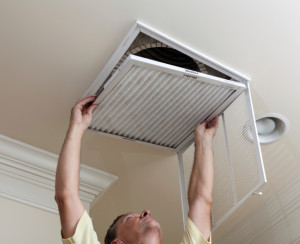 An air filter is an often-overlooked component of an HVAC system, but as today’s homeowners become more and more aware of energy efficiency, air filters are receiving more attention. They deserve to be in the spotlight, because they have a lot to do with effectiveness of your system. What’s more, a quality air filter comes with other benefits you may not have considered. Read on to learn more about how an air filter works.
An air filter is an often-overlooked component of an HVAC system, but as today’s homeowners become more and more aware of energy efficiency, air filters are receiving more attention. They deserve to be in the spotlight, because they have a lot to do with effectiveness of your system. What’s more, a quality air filter comes with other benefits you may not have considered. Read on to learn more about how an air filter works.
Filter Basics
When your HVAC system was installed, it was likely fitted with a standard air filter. Such filters do a reasonable job of protecting your HVAC system’s components, but their abilities basically stop there. An air filter can be designed to stop dust, debris, allergens, bacteria, germs, and other pollutants from entering your breathing space. On top of the air filter in your HVAC system, there are portable as well as whole-house systems. The higher the efficiency rating for any type, the more contaminants it will be capable of trapping — though the highest rated filters (true HEPA air filters) are usually only appropriate for hospital-type environments.
Getting the Most Out of Your Filter
Choosing a high-quality air filter is just the start of promoting an HVAC system that stays in peak condition. Filters should be changed every one to three months. During the heating and cooling seasons, you’ll likely notice it gets dirty quicker and may need changing monthly.
Benefits of Air Filters
- Your system will have improved airflow, and thus greater energy efficiency.
- A more efficient system means lower monthly utility costs.
- The chance of untimely breakdowns will be reduced.
- The quality of your indoor air will be better.
- Your household’s carbon footprint will be reduced.
For more information on how an air filter can improve the efficiency of your HVAC system, call Maxx A/C & Heating at (281) 338-2653.
Image provided by Shutterstock

